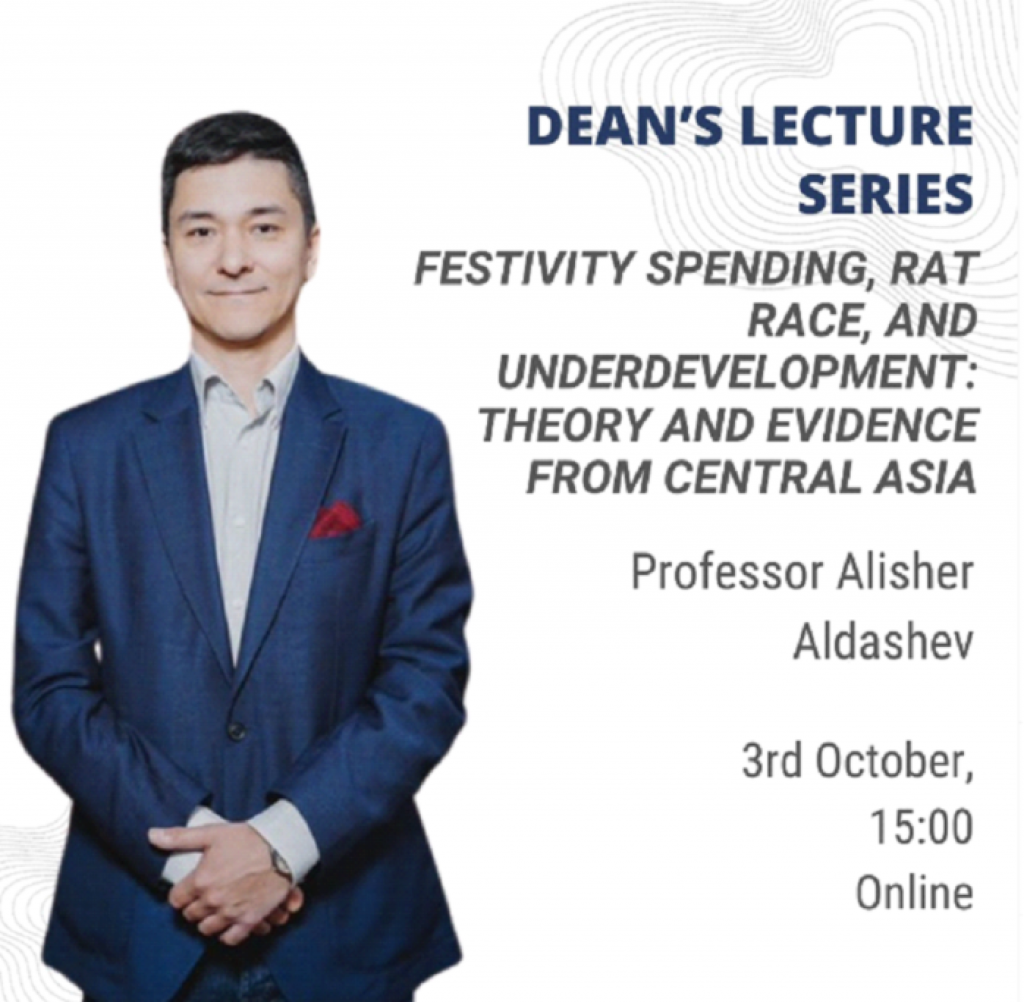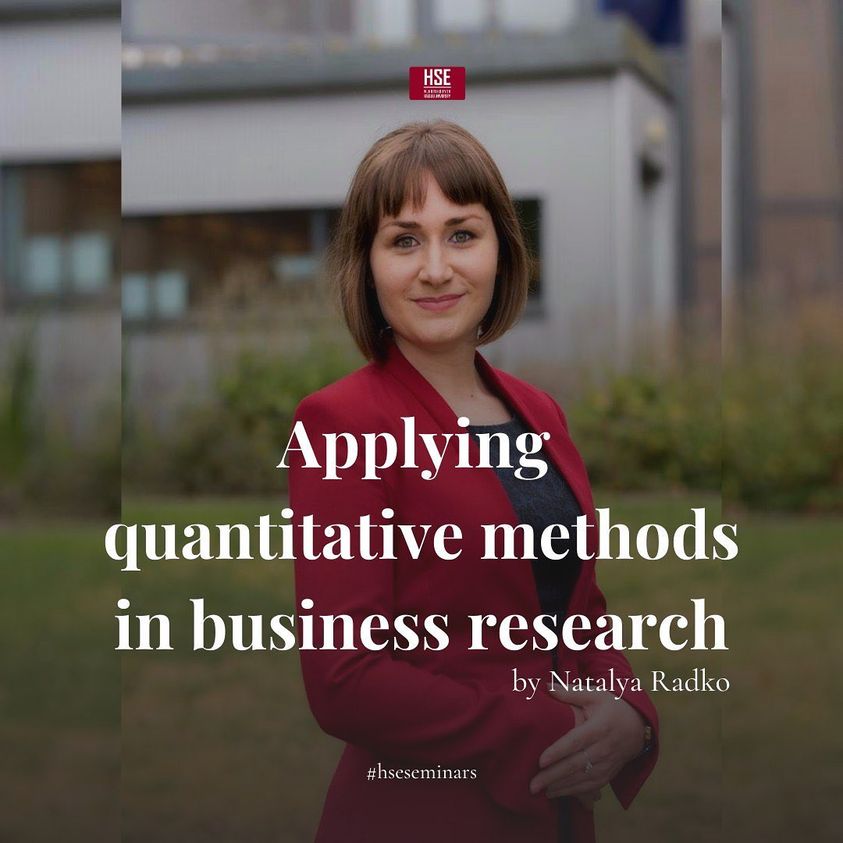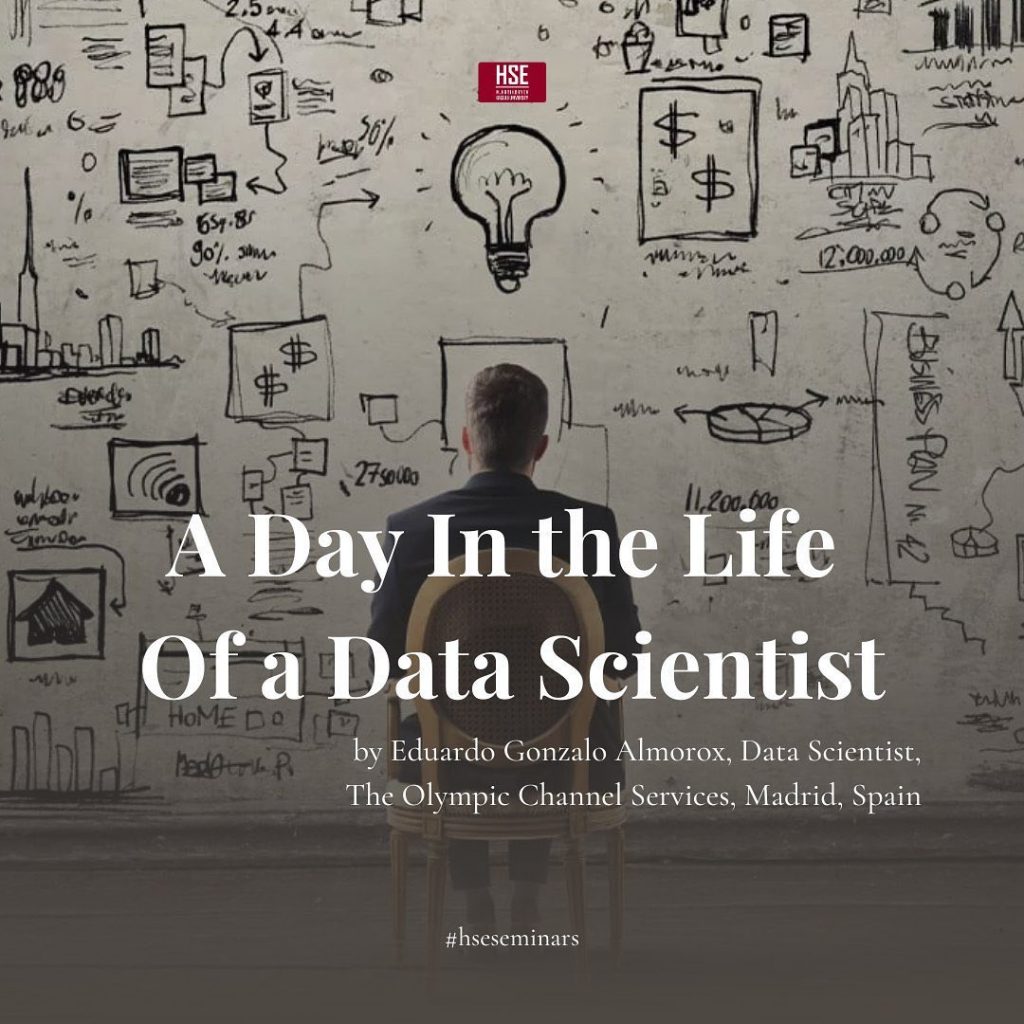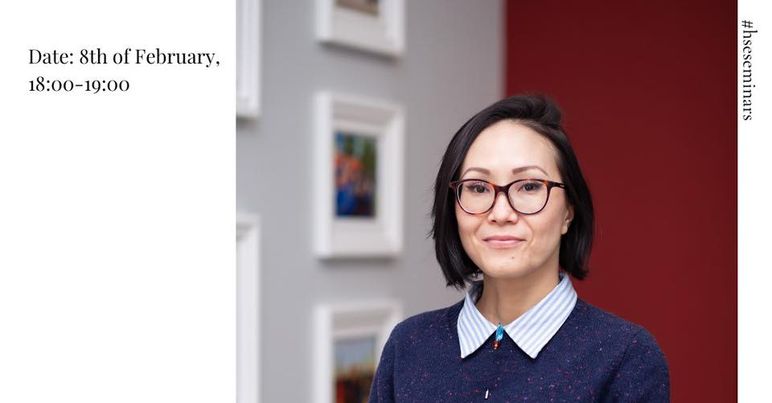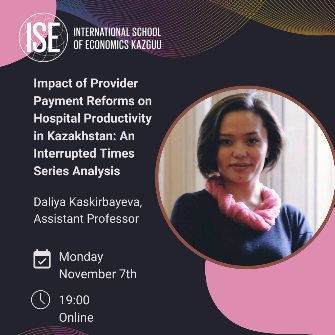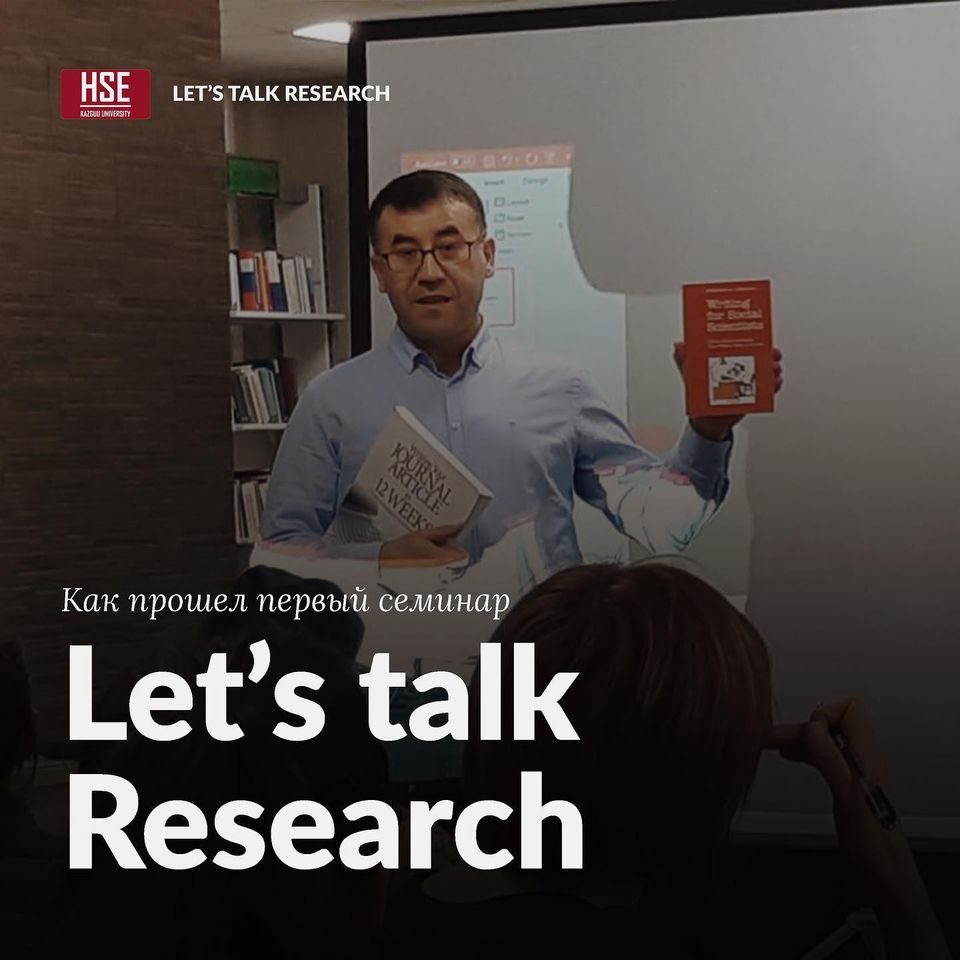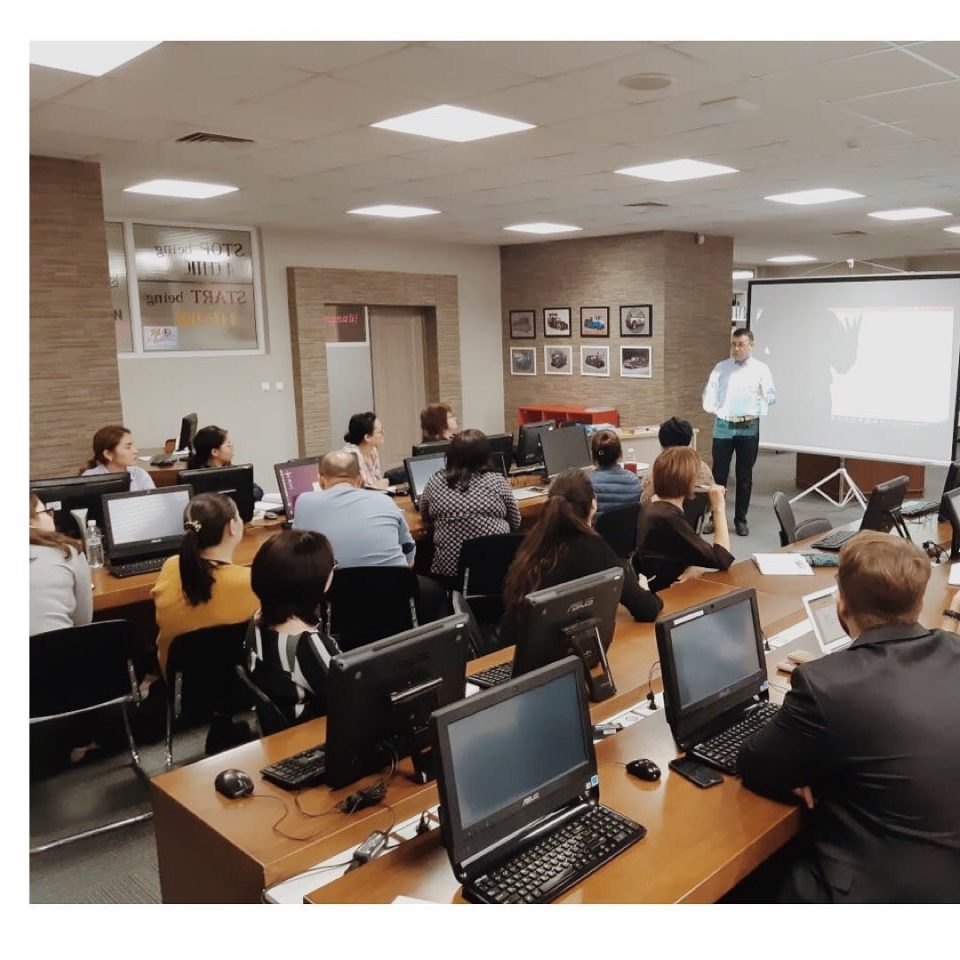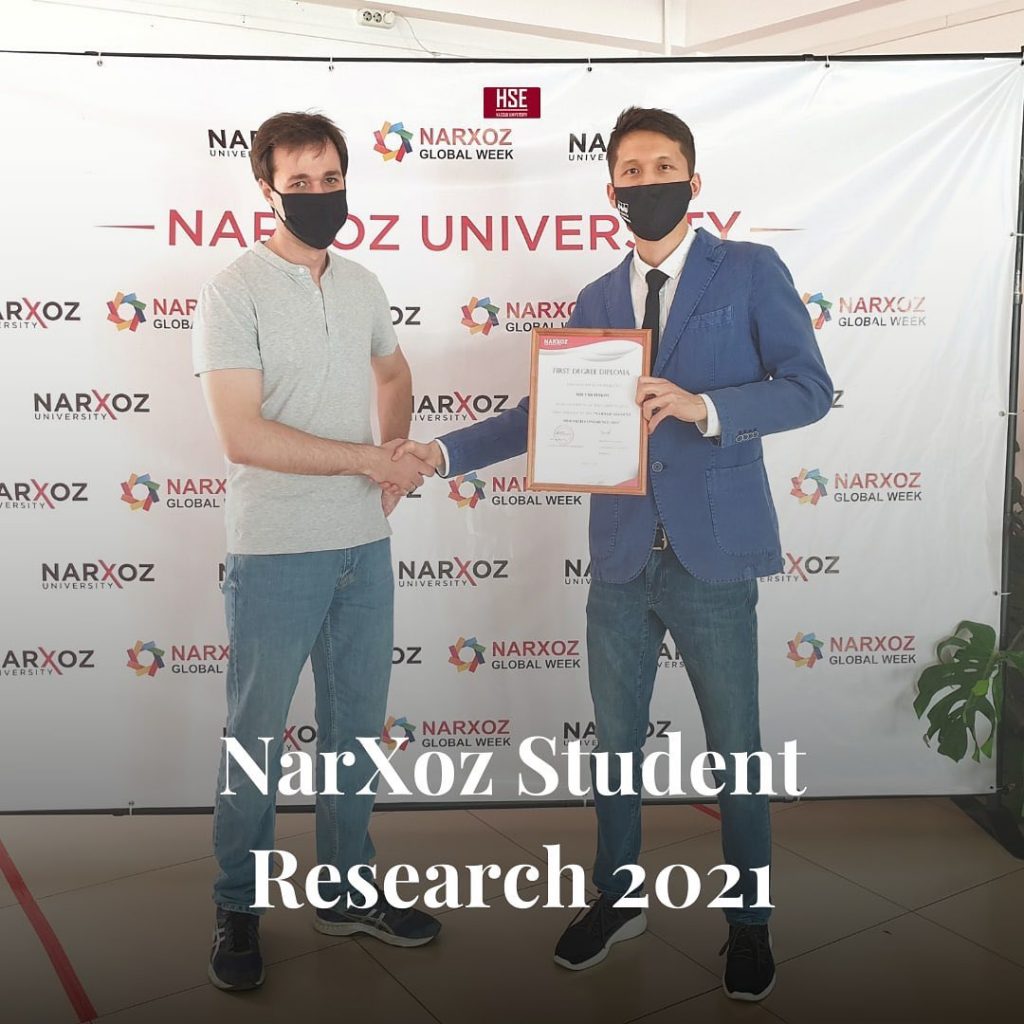Topic: Digital Citizen Activism in Central Asia: beyond contestation and cooperation
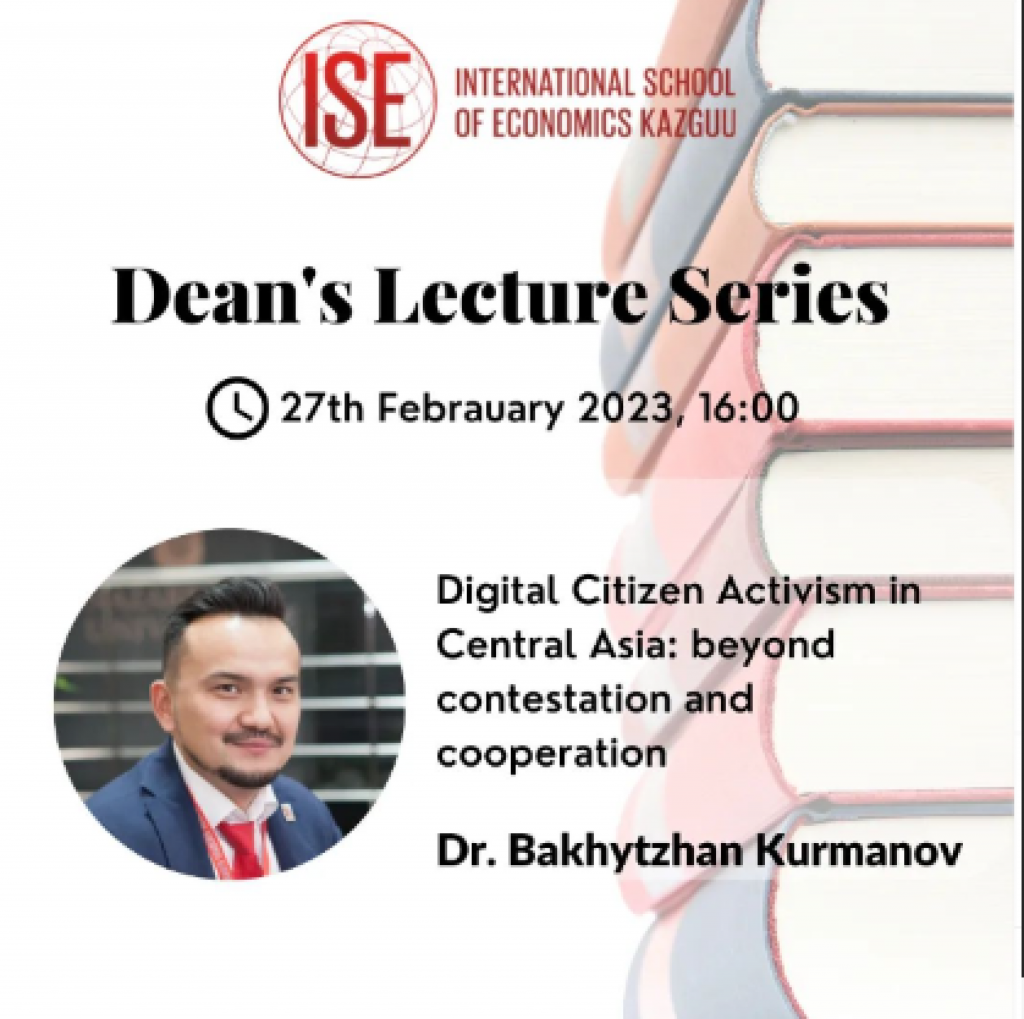
Abstract: The recent rise of digital activism in the Arab Spring revolution and Euromaidan demonstrated the significance of social media and new technologies in mobilizing civil society activists in authoritarian regimes. Digital citizen activism has also been on the rise in post-Soviet Central Asia, with the evidence that the October events in Kyrgyzstan in 2020 and the January riots in Kazakhstan in 2022 were fueled by the heightened tension and mobilization of citizens in social media. This chapter proposes to investigate how digital activism evolves and engages with the authoritarian states in autocratic post-soviet Central Asia. This work aims to answer the following questions by uncovering the activities of the digital activism communities through in-depth interviews with activists in Kazakhstan, Uzbekistan, and Tajikistan.
✨About the author: Bakhytzhan Kurmanov is an Assistant Professor, International School of Economics, M. Narikbayev KAZGUU University, Astana, Kazakhstan. Bakhytzhan’s research interests include open government, citizen activism, authoritarian politics, public sector reforms, and the political economy of the post-soviet countries. He holds PhD in Public Policy at Nazarbayev University in 2021, investigating Open Government reform in Central Asia. Bakhytzhan received his Master’s degree in public administration from the Australian National University in Canberra and his BA in public policy and management from York University in Toronto. He previously worked on various assignments in the United Nations Development Programme, the Asian Development Bank, the Economic Research Institute at the Ministry of National Economy, and other Kazakhstani think tanks
Within our Dean’s Lecture Series Dr. Kamshat Sаginbekova presented her PhD thesis study. 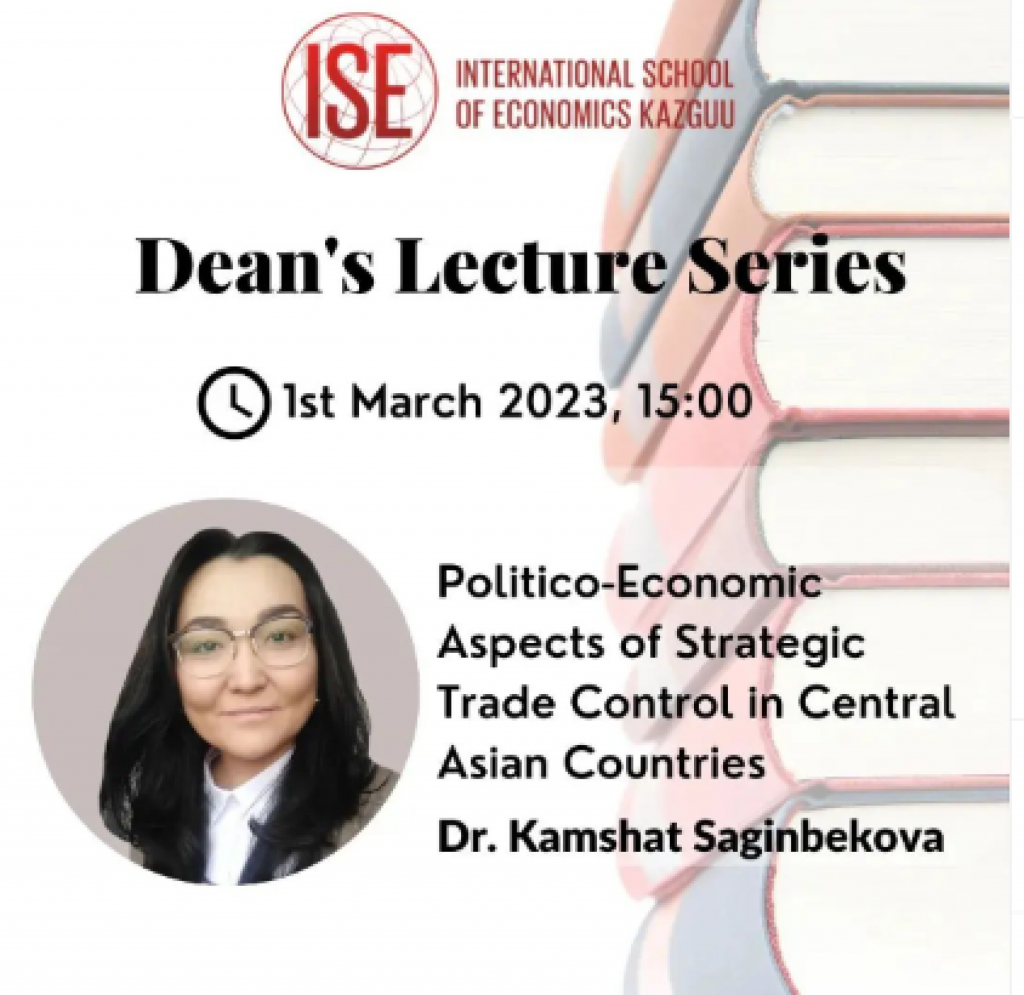
Topic: Politico-Economic Aspects of Strategic Trade Control in Central Asian Countries
Abstract: Interdisciplinary research aims to consider the economic effects of a political tool such as strategic trade control after its adoption and implementation in various Central Asian countries, namely Kazakhstan, Kyrgyzstan, Tajikistan, Turkmenistan, and Uzbekistan. The study seeks to understand the political and historical backgrounds of implemented control systems and grasp the current status based on the descriptive analysis of strategic trade control elements by applying the 3WH method (“Why? Who? What? How?”). The study then analyses the economic effects of adopting and implementing control systems by applying two approaches to examine the implications of dual-use technology transfer. First, to explore the impact of strategic trade control on trade flows (exports and imports) of dual-use items. Second, to analyse the impact of imports of dual-use technology on total factor productivity.
About the author: Kamshat Saginbekova, PhD in Political and Social Sciences, Teaching Professor at International School of Economics, M.S. Narikbayev KAZGUU University. Kamshat has defended her PhD thesis on Strategic Trade Control in Central Asian Countries by analysing the export control systems in five countries and studying the economic aspects of the taken political decision. Kamshat has an economics background and experience in academia, research institutes, and the corporate sector.
Associate Professor of the ISE Dr. Azat Aituar presented his study within our Dean’s Lecture Series.
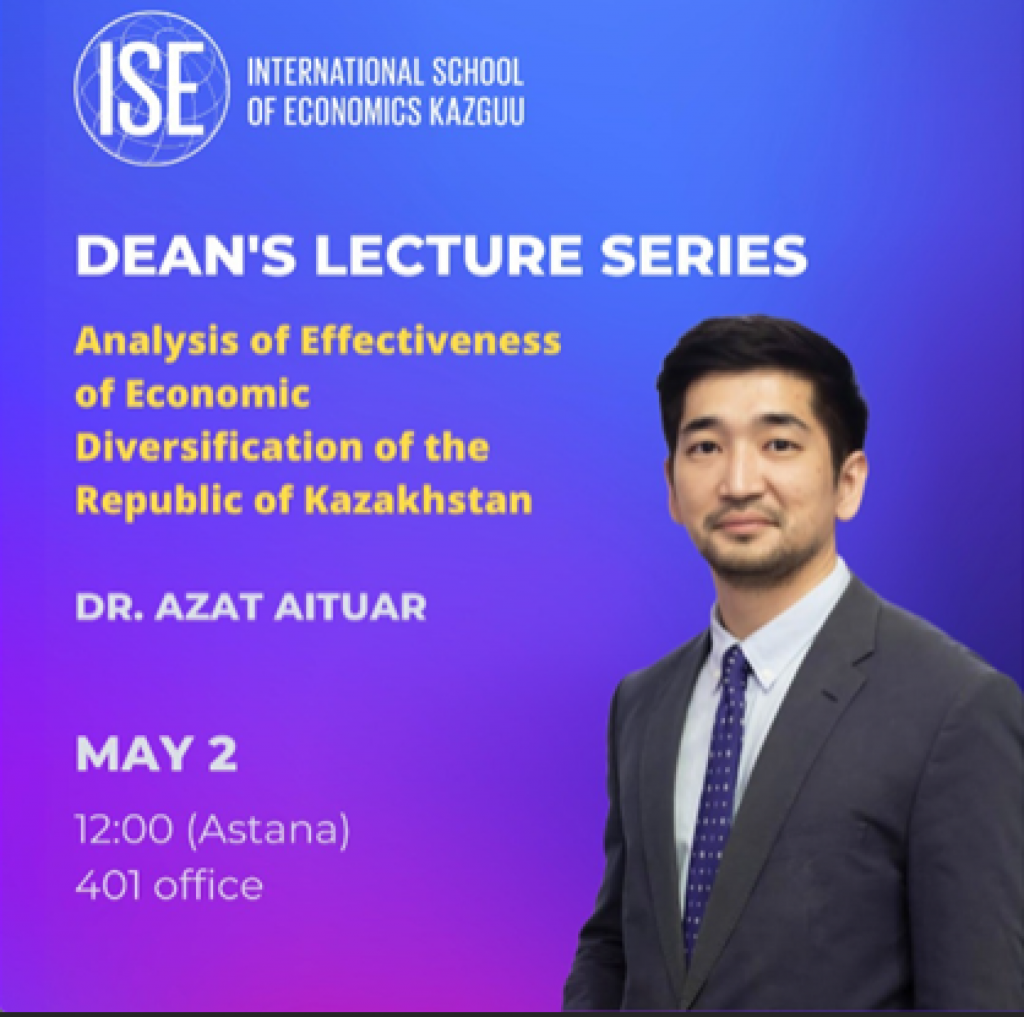 Topic: Analysis of Effectiveness of Economic Diversification of the Republic of Kazakhstan
Topic: Analysis of Effectiveness of Economic Diversification of the Republic of Kazakhstan
About the author: Dr. Azat Aituar – PhD, Associate Professor of International School of Economics of Maqsut Narikbayev University. Azat has enormous experience gained working at different positions of national and international companies. He got his PhD in Economics from the University of Reading (UK) in 2016, Bolashak scholar. His field of study is Economic growth and International trade.
Dr.Alisher Aldashev presented his study of “Festivity spending, rat race, and underdevelopment: Theory and evidence from Central Asia.”
Utilizing a comprehensive household survey from Kyrgyzstan, the study reveals a significant portion of income being channeled towards festivities, often sidelining essential needs such as food and education.
While these festive expenditures boost social stature and extend social connections, they negatively impact health and educational outcomes, further entrenching poverty cycles. We develop a model emphasizing the competitive nature of such spending, suggesting that mere financial market reforms might not alleviate poverty.
Alisher Aldashev is a Professor of Economics at KBTU and is widely recognized as one of the most cited economists in Kazakhstan, as evidenced by his impressive Scopus H-Index. His academic focus lies within the realms of development and labor economics. Dr. Aldashev earned his doctoral degree in Economics from the esteemed University of Regensburg in Germany. He boasts a rich professional background, having contributed his expertise to various institutions including the University of Regensburg, the Center of European Economic Research (ZEW) in Mannheim, and Satbayev University. His scholarly pursuits encompass the fields of language economics, values, informal institutions, and the dynamics of immigrant labor. His extensive experience includes active involvement in research projects, some of which were commissioned by such prestigious entities as the Federal Ministry of Labor and Social Security in Germany, the German Science Foundation, Volkswagen Foundation, and Kazakhtelecom JSC. In these projects, Dr. Aldashev assumed the role of chief economist, applying his expert skills in econometric modeling. Currently, Professor Aldashev serves as a Co-Principal Investigator in a Nazarbayev University Grant Project titled “The Influence of Tradition, Culture, and Historical Factors on Economic Outcomes in Central Asia and Russia.”
Dean’s Lecture Series in 2022
Economic Returns to Skills in Kazakhstan in the Context of International Comparisons by Saule Kemelbayeva, Dean of the ISE.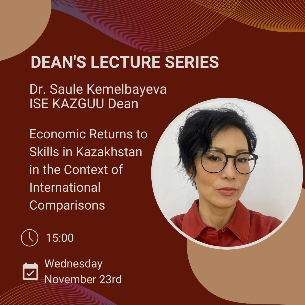
The study examines the economic returns to literacy, numeracy and problem-solving skills in adults in Kazakhstan with the OECD data. Unlike in other countries, the returns to skills are neither economically nor statistically significant. This finding, however, is fully driven by the public sector of the economy, while in the private sector the skills significantly improve one’s earnings. The returns to formal education accounting for skills are comparable in public and private sectors. This likely causes the outflow of most productive workers to the private sector and question the efficiency of the public sector of the economy in Kazakhstan.
Educated into Sinophilia? How Kazakh Graduates/Students of Chinese Universities Perceive China by Zhanibek Arynov, Assistant Professor at the Graduate School of Public Policy, Nazarbayev University
This article examines perceptions of China and contributes to the ongoing academic debate on Sinophobia in Central Asia. However, unlike existing studies, it specifically focuses on perceptions of those, who have first-hand China experience – Kazakh students/graduates of Chinese universities. Based on in-depth interviews with them, the article argues that those with first-hand China experience tend to reject the China threat theory, found to be widespread among the general population. Instead, China educated Kazakh youth perceive China mostly as an economic opportunity for their own country. Yet, this does not necessarily make them Sinophiles in the sense that they still express certain concerns related to their country’s potential over-dependence on China. But more interestingly, they see China as the “civilizational other.” This perceived civilisational abyss even among the more-informed segments of the population appears to be one of the main causes of the alienation of China and the Chinese in Kazakhstan.
Applying Quantitative Methods in Business Research
ISE welcomes Master’s students and researchers to the webinar series.
⠀
If you are a positivist and are in love with numbers, logic, and an objective stance, please join our next webinar “Applying quantitative methods in business research” by Natalya Radko. Natalya is a PhD researcher at Henley Business School. Her research focuses on analysing and evaluating entrepreneurial outcomes of universities and companies. In addition to being a teaching assistant at Henley Business School, as part of her PD scholarship, Natalya is a manager within the Creative Spark: Higher Education Enterprise Programme. This is a five-year British Council initiative to support partnerships to develop enterprise skills and creative economy across seven countries in Central Asia and South Caucasus.
⠀
Business owners are often forced to make decisions under conditions of uncertainty. Luckily, quantitative techniques enable them to make the best estimates and thus minimize the risks associated with a particular decision.
⠀
Webinar will introduce students to Regression as one of the techniques for quantitative data analysis in order to understand the behaviour and performance of a business. We will go through different type of regression analysis based on data types.
A Day In The Life of A Data Scientist
ISE welcomes students and researchers to our webinar series. The next webinar ” ” is conducted by Eduardo Gonzalo Almorox, Data Scientist, The Olympic Channel Services, Madrid, Spain.
⠀
Data scientist and economist with more than 12 years of international and multicultural experience in research and data analytics. Specialized in the design of tools that enable the collection of social data and the application of (quasi) experimental techniques to evaluate different types of strategies.
Eduardo uses machine learning and statistical models to provide interpretable business insights from complex data and communicate craft solutions to technical and non-technical audiences.
Quasi-experimental methods: how to address causal questions with observational micro-data?
“In an ideal world, the best thing to establish causality between two phenomena is to run an experiment. The reality (especially, in social studies) is often too complex for experiments. However, observational data sometimes could be treated as experimental data. In this session, I will briefly go through the basics of the main quasi-experimental methods such as matching, instrumental variables, regression discontinuity design, difference-in-differences, and panel data methods, explain them intuitively, and provide you with references for further self-studies.
The seminar is for a wide audience interested in quantitative methods, understanding basic OLS regression is preferable.” – Saule Kemelbayeva, Dean of ISE.
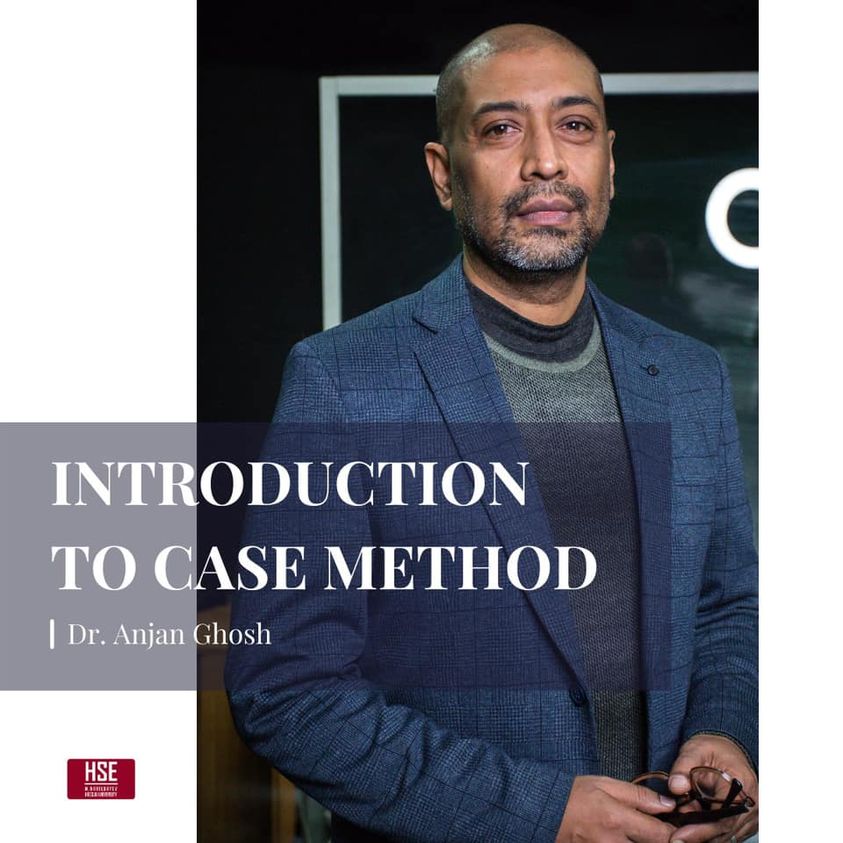
Introduction To Case Method
ISE welcomes Master’s students and researchers to the research webinars series.
⠀
Our next speaker is Dr. Anjan Ghosh, Associate Professor of Strategy and Entrepreneurship, and Director of Silk Road Case Center, Narxoz University.
⠀
Case Method consists of case study research, authoring case studies and case method of teaching. Undertaking case study projects helps students to develop and apply decision-making skills through structured scientific approach. Converting such projects to scientific case studies strengthens a student’s CV. Such studies, when published, establishes a student as both an analyst and research scholar opening opportunities in the job market as well as in higher studies.
⠀
For faculty members, case method teaching helps them to make learning more participatory and engaging. Case method research may help them to undertake reflexive research and strengthen both teaching and publishing.
⠀
In “Introduction to Case Method” – Anjan helps the audience to explore the world of Case Teaching, Case Research and Case Authoring.
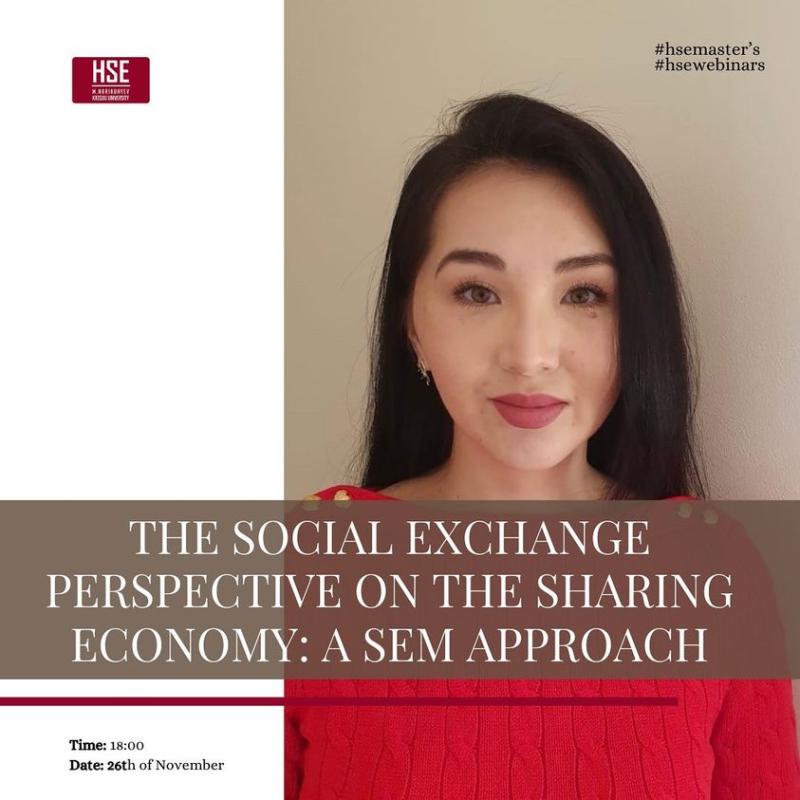
A Social Perspective on Exchange in a Sharing Economy: Structural Equation Modeling
ISE KAZGUU is pleased to invite researchers and postgraduate students to a webinar by Dinara Davlembayeva, Associate Research Fellow at Newcastle University Business School: “A Social Perspective on Exchange in a Sharing Economy: Structural Equation Modeling”. Dinara has over seven years of professional and academic experience in marketing and research. Dinara’s research interests mainly include the application of innovative technologies in people’s lives, consumer behavior in online communities and the impact of online systems on social organizations.
With consumers’ growing reliance on the sharing economy (represented by Airbnb, Couchsurfing, Time Banking, etc.), there is still little evidence in the literature about the factors driving exchange in this sector of the “economy.” Given the gaps in the literature, at the webinar, Dinara will present the results of research work aimed at studying psychological and social motives, as well as the impact of the sharing economy on social integration and subjective perception of the quality of life.
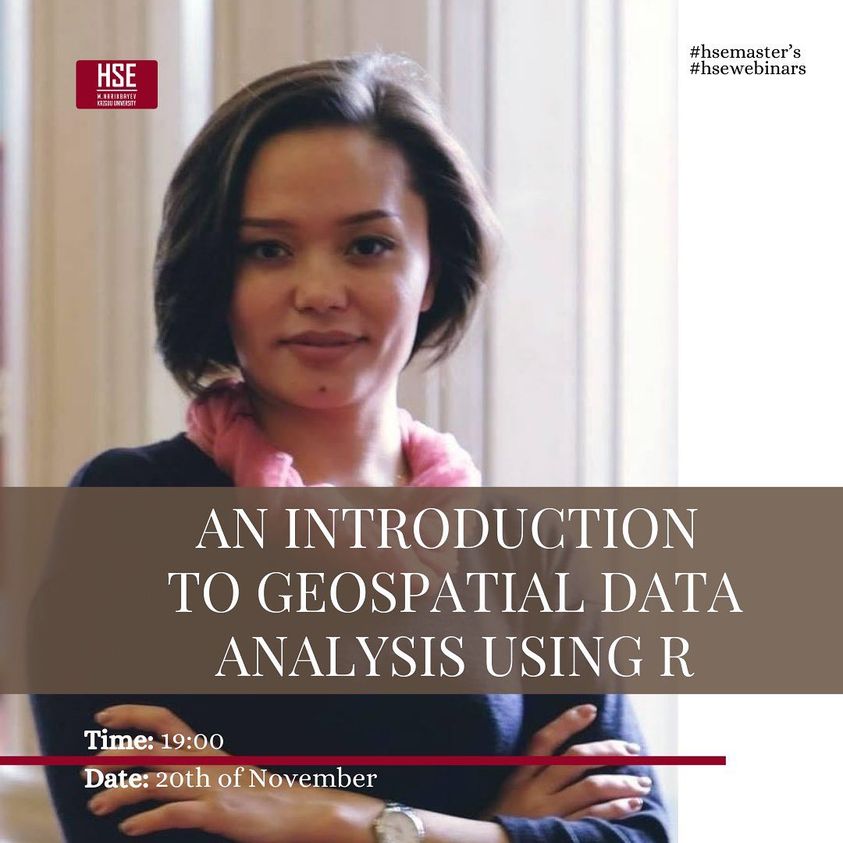
An Introduction to Geospatial Analysis Using R
Daliya Kaskyrbaeyva is currently working on her research at the University of Leeds. Her research focus is on assessing the impact of provider payment reforms on hospital productivity in Kazakhstan. She has also collaborated on a range of health economics research projects such as health costing model and voluntary health insurance; and provided methodological support to the Ministry of Health and local authorities in Kazakhstan.
This seminar is designed to provide an introduction to handling, analysing and visualising geospatial data using various R packages.
⠀
Learning activities:
· Introduction to geospatial data
· Preparing data for mapping: download, upload and merge data (15’)
· Mapping using Kazakhstan map: bubble maps, choropleth maps (15’)
· Bonus: interactive maps
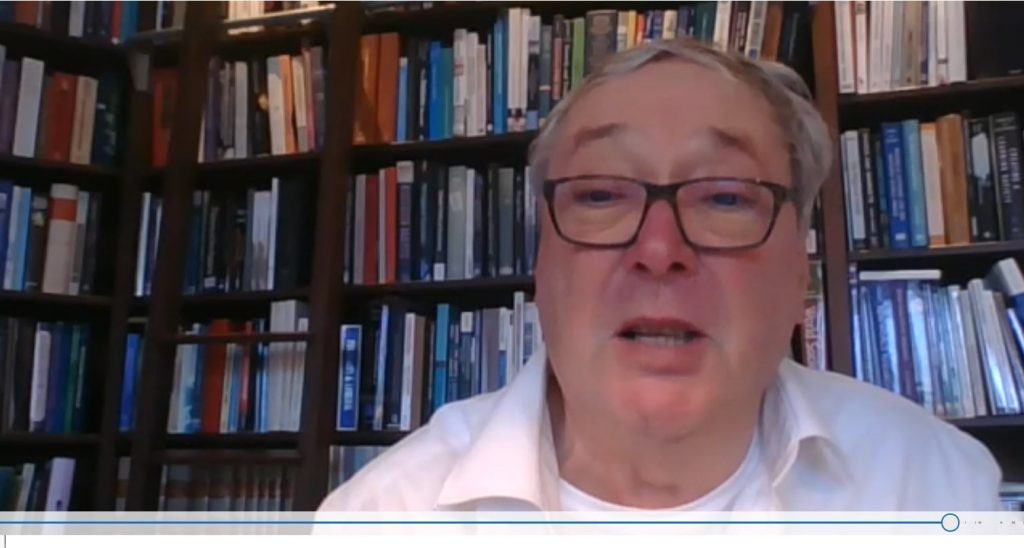
How to supervise Master’s dissertations
We would like to thank Professor Richard T. Griffiths, Leiden University, for the webinar: “How to supervise Master’s dissertations”. He shared his experience and expertise in managing the research process of postgraduate students.
At Leiden Richard set up the MA in European Union Studies and the BA in International Studies. His expertise lies in the field of European integration and in the critical analysis of the data employed in social science and economics analyses. He is one of the few academics who remembers when writing was done with a pen and a set of index cards. He enjoys syllabus design and experimenting with new innovatory teaching methods. Prof. Richard Griffiths graduated in economic history and Russian studies at Swansea University College and holds a PhD in History from Cambridge University.
It was an interesting and stimulating discussion for our colleagues from ISE KAZGUU and other Kazakhstani universities.
Our guest is Dr. Zhanibek Arynov, who shared his expertise on conducting case study researches
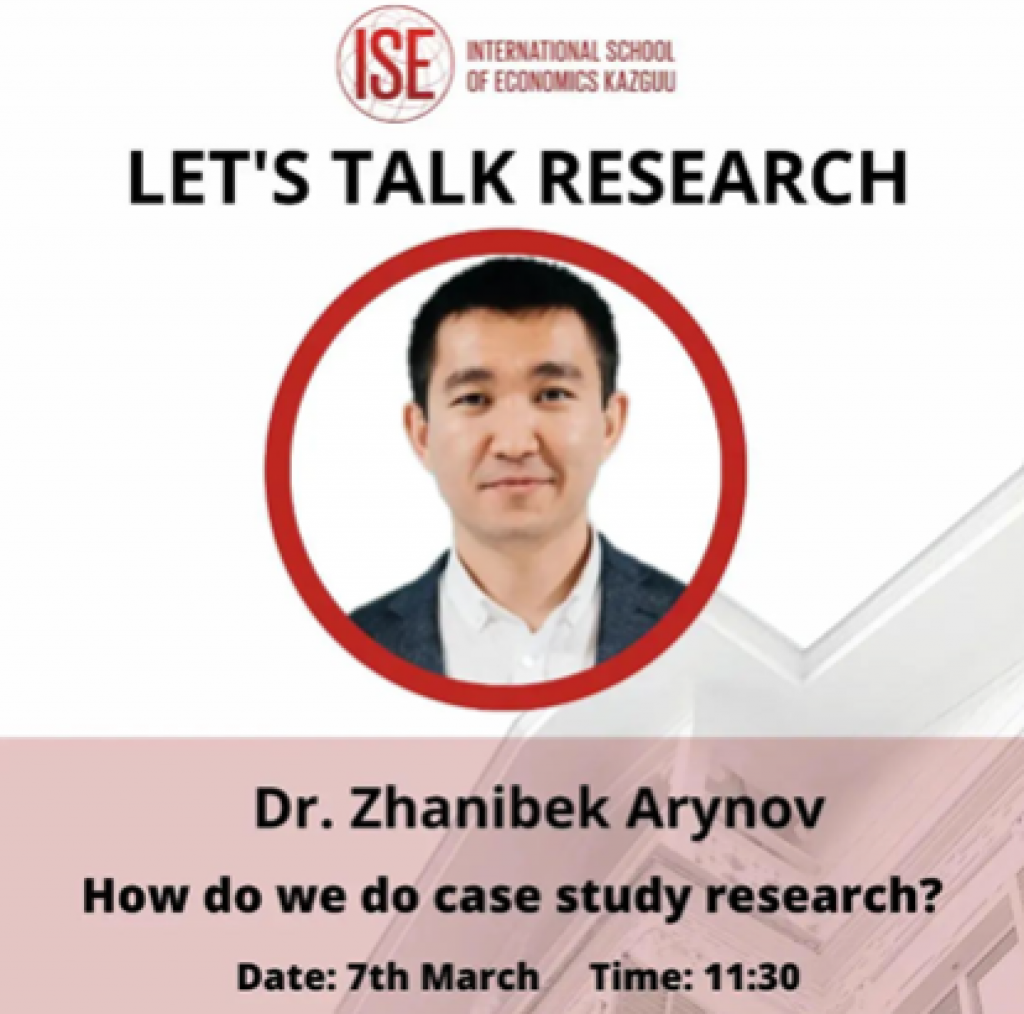
Topic: “How do we do case study research?”
Synopsis: Case studies are a powerful research design in IR that can provide valuable insights into the complexities of global politics. By examining specific cases, researchers can gain a deeper understanding of the many different factors that contribute to global politics and identify practical solutions to real-world problems. Case studies allow for a detailed and comprehensive analysis of a particular event or phenomenon. Researchers can gather rich data and explore complex relationships between variables that may not be captured by other research methods. They are often based on real-world events and situations, providing practical insights that can be applied to real-world problems. Case studies enable researchers to examine the unique contextual factors that shape particular events or phenomena.
✨About the author: Zhanibek Arynov is an Assistant Professor at the Graduate School of Public Policy, Nazarbayev University. He obtained a Ph.D. degree in International Relations from the University of St. Andrews, UK. Dr. Arynov’s research interests include Central Asian geopolitics, Kazakhstan’s foreign policy, EU-Central Asia relations, and international identity, image and perception studies. He is currently working on a project related to the legitimacy and (de)legitimation of international organizations with a specific focus on the Eurasian Economic Union.
Impact of Provider Payment Reforms on Hospital Productivity in Kazakhstan: An Interrupted Times Series Analysis by Daliya Kaskirbayeva, Assistant Professor at the ISE
Worldwide demand for enhanced hospital productivity has propelled the implementation of new provider payment schemes across many countries. The impact of these hospital payment reforms on hospital productivity is, however, rather under-researched. This research aimed to address this evidence gap by conducting two case studies on provider payment reforms in Kazakhstan. Two quasi-experimental designs, a controlled interrupted series approach and a single interrupted time-series were used to evaluate the immediate and delayed impacts of the newly introduced provider payment policies: diagnosis-related groups and global budgets. The studies suggest that the two hospital payment systems that were consequently introduced in Kazakhstan had a limited effect on hospital productivity.
Scopus and ScienceDirect: basic principles and new opportunities and How to get published in the international peer-reviewed journals by Botakoz Suleimenova, Official Trainer of Elsevier in Central Asia
The webinar provided students with the basic research skills and give strategy on how to work in Scopus. The seminar was tasked with explaining scientific metrics to make better decisions and how to find people for collaboration. The webinar gives an overview what is CiteScore or percentile and answers all of your questions. Another topic addresses understanding of publication requirements and procedures as well as an approach in finding a suitable journal.
Let’s Talk Research seminars, organized by Higher School of Economics of KAZGUU University, intend to provide an overview of skills, best practices and life hacks to start and finish international publication projects.
Higher School of Economics of M. Narikbayev KAZGUU University hosted an online ‘Let’s Talk Research’ seminar with topic “How to address the problem of predatory publications?” on 1 March 2021. Dr. Martin Srholec (Deputy Director of Center for Economic Research and Graduate Education – Economics Institute of Charles University and the Economics Institute of the Czech Academy of Sciences), Dr Bulat Kenessov (Director of Center of Physicochemical Methods of Research and Analysis and Professor of Al-Farabi Kazakh National University) and Dr. Ikboljon Qoraboyev (Associate Professor of International Relations of Higher School of Economics of M. Narikbayev KAZGUU University) explained different aspects of the problem of predatory publishing and discussed best ways and strategies to address this problem. More than 100 participants from different Kazakhstani and foreign Universities took part in the webinar.
Dr. Martin Srholec underlined that phenomenon of predatory publications is a global problem for academia today and there is a need for a collaborative action against predatory publishing which must bring together higher education policy makers, Universities and scholars.
Dr. Bulat Kenessov discussed efforts to fight predatory publications in Kazakhstan. He underlined that Kazakhstan has implemented a set of measures to reduce number of predatory publications by authors from Kazakhstan. As a result of these measures, share of publications of Kazakhstani authors in journals which were discontinued in Scopus fell down from 38.4% (1st place) in 2016 to 10.9% (5th place) in 2020. However, he noted that this situation is still unsatisfactory and Kazakhstan must target to bring down share of predatory publications to 1% in order to reach level of advanced countries.
Dr. Ikboljon Qoraboyev explained that phenomenon of predatory publications is taking oversized form in post-Soviet countries. He highlighted four major levels which explain why authors publish low-quality articles in predatory and suspicious journals. These factors are related to policy level, institutional level, individual level and market level. Pressure to publish a high number of publications in short time is leading researchers to ignore these important steps of the process of preparing academic articles. There is a need to strengthen process-focused approach to publishing in order to reduce problem of predatory publications. For this, public agencies and Universities must provide more training and support to researchers.
Watch webinar recording
The first lecture was held within Let’s talk research seminar on October 25th, 2019.
Professor Ikboljon Qoraboev spoke about the importance of publishing in an academic and research career, publishing strategies in international publications, and demonstrated practical tools that every researcher needs.
The Higher School of Economics would like to thank Professor Ikboljon Qoraboyev for promoting research culture.
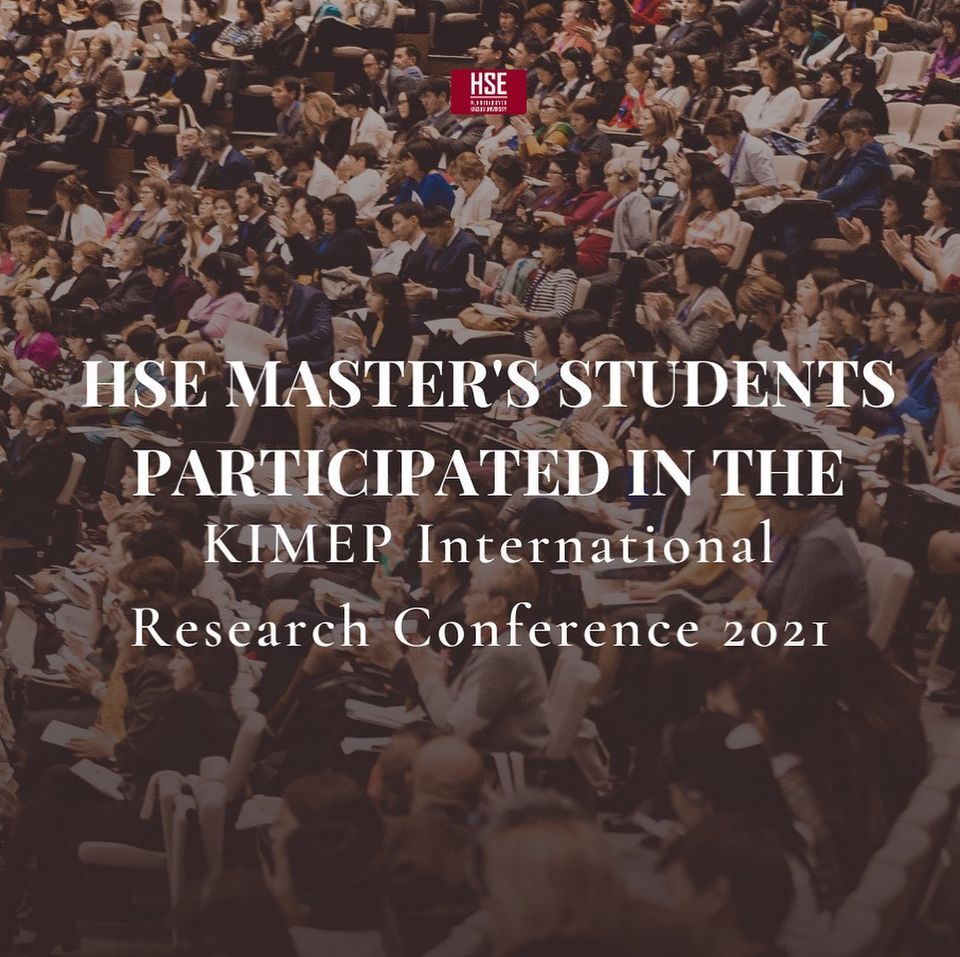
ISE Master’s students participated in the KIMEP International Research Conference 2021 on April 9th, Friday.
The topic of the conference was “Business, Economy and Society: Challenges in the Post-Pandemic Era”.
Our students’ papers were reviewed and accepted for the session on Human Resources where the labor market was explored both from HR and Economics perspective.
Adi Taichakov and Arman Olzhabayev (Master’s in Finance program) presented a paper “Analyzing the Labor Market Conditions in Kazakhstan Through the Lens of the COVID-19 Pandemic”. Alibi Zhabykpay (Master’s in HRM program) discussed the issue of “Development of successful HR brand”.
We wish our students good luck in their further research activities.
ISE would like to congratulate Adi Taichakov and Arman Olzhabayev (Both Master’s in Finance programme students) on their victory at the science conference “NarXoz Student Research 2021”!
“It is my pleasure to inform you that our research project “Forecasting the Long-Term Employment in Kazakhstan” has received the first place on the “NarXoz Student Research 2021” science conference. Among more than 80 research papers selected from the various Kazakhstani universities in the first stage of selection, our paper has become one of the eight works in the “Economics” section which received the right to be presented in front of the conference committee & participants on the 11th of March (after passing the second stage of selection, which included the face-to-face interview with the organizing committee).
On the online conference, there were many interesting research projects, and I believe we managed to receive the first place not only due to the quality of our work (which is work in progress, but still managed to impress the committee), but also due to our confident answers during the Q&A, where we demonstrated the detailed understanding of the topic. Arman and I would like to thank Dr. Saule Kemelbayeva for guidance in this project that made this achievement possible” said Adi Taichakov.
 MAQSUT NARIKBAYEV UNIVERSITY
MAQSUT NARIKBAYEV UNIVERSITY
